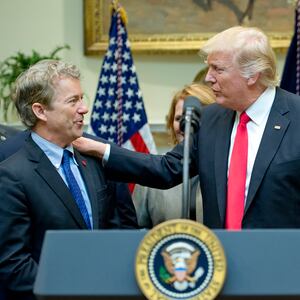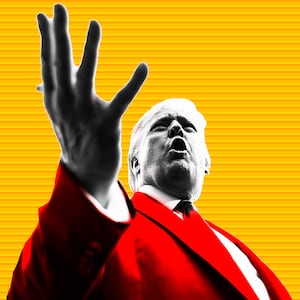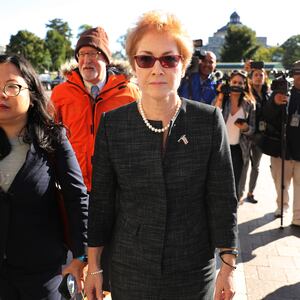The lead impeachment inquiry lawyer for House Republicans named the alleged Trump-Ukraine whistleblower during a deposition with a key State Department witness.
U.S. Ambassador to Ukraine William Taylor told the lawyer that he did not know the person and had not had conversations with him. But the fact that he was asked at all underscores what appears to be a longstanding strategy by committee Republicans to insert his name into the public record. The name of the individual ultimately was included in the transcript of Taylor’s deposition.
In subsequent depositions, Democrats have accused Republicans of trying to use the witness interviews as back-door channels for outing the whistleblower. Their fears have grown even more pronounced in recent days as several lawmakers—most notably Sen. Rand Paul (R-KY)—have threatened to subpoena and reveal the identity of the whistleblower. The president’s son, Don Jr., appeared to take things even farther, tweeting out an article from Breitbart on Wednesday morning naming the alleged whistleblower.
ADVERTISEMENT
The Daily Beast has previously reported that an aide to Rep. Devin Nunes (R-CA), Derek Harvey, has provided conservative politicians with notes on the alleged whistleblower, including some misinformation along with the individual’s name.
The name of the alleged whistleblower, which The Daily Beast has not independently confirmed and will not publish here, has been circulated widely by right-wing media; much to the chagrin of his lawyers who have warned that their client’s safety is being deliberately threatened as part of a witness intimidation scheme by the president’s allies.
Taylor appeared in front of House investigators last month to reveal what he knew about efforts by Trump administration officials and Rudy Giuliani to dangle military aid and a presidential meeting before Ukraine’s leaders in order to strong-arm them into launching investigations into a gas company linked to former vice president Joe Biden’s son and unsubstantiated claims Ukrainian officials interfered in the 2016 election on behalf of Hillary Clinton.
During Taylor’s deposition, Rep. Mark Meadows (R-NC) peppered the ambassador with questions about how exactly he knew that former National Security Adviser John Bolton was supportive of the idea of releasing U.S. military aid to Kyiv after it was held up in what Democrats believe was a pressure campaign to force Ukraine’s hand.
“I was aware, Congressman, in the discussions that followed the meeting at the NSC where the hold was put on,” Taylor said. “And was told a couple of times by people at State and people at the NSC that the Secretary of Defense, Secretary of State, the National Security Adviser, and the head of CIA all strongly supported the resumption of this assistance.”
Meadows pressed Taylor for more details of the names of individuals he spoke to at the National Security Council who provided information about Bolton’s thinking on the Ukraine situation.
“I guess I'm a little concerned on who at NSC would've been telling you about Ambassador Bolton,” Meadows said. “You felt like he was a kindred spirit on this. So who was telling you from the NSC that he was?”
Eventually, Republican committee lawyer Steve Castor directly asked Taylor if he’s heard of or had communicated with the official that conservative media has identified as the alleged whistleblower. Taylor denied knowing him.
The transcript also provided a window into how Republicans could seek to discredit Taylor during his public testimony, which is currently scheduled for Nov. 13. Several members, including Rep. Lee Zeldin (R-NY) as well as the minority counsel, repeatedly asked Taylor the source of his information and whether or not he heard it himself or secondhand— ignoring the substance of the information and the fact that the answers they sought were painstakingly documented in his opening statement.
Taylor’s account also corroborated past witnesses’ testimonies, providing detail about when he and others he worked with in the State Department first understood there to be a connection between a visit to the White House by Ukrainian President Volodymyr Zelensky and the delivery of U.S. military aid to investigations pushed by Giuliani. He pointed to EU Ambassador Gordon Sondland and former top diplomat to Ukraine Kurt Volker as two of the main operators pushing Zelensky to commit publicly to investigating the Bidens.
Sondland, Taylor said, linked aid to investigations in his conversations with Ukrainian officials. Volker told him that he “planned to be explicit with President Zelenskyy in a one-on-one meeting in Toronto on July 2 about what President Zelenskyy should do to get the White House meeting.”
Taylor raised concerns with officials at the State Department, including with Sondland, about the connection between Zelensky taking up Giuliani’s pitch for investigations and U.S. military aid. Sondland pushed back in a text message.
“The President has been crystal clear no quid pro quo's of any kind,” Sondland said in his message to Taylor. “The President is trying to evaluate whether Ukraine is truly going to adopt the transparency and reforms that President Zelensky promised during his campaign I suggest we stop the back and forth by text.” Sondland this week submitted an addendum to his testimony in which he stated that he did, in fact, translate to the Ukrainians that there was a quid pro quo —that they had to commit to the investigations publicly before receiving crucial U.S. military aid.
Asked by Meadows why Taylor wasn’t “exuberant” upon hearing that the president said there was no quid pro quo, Taylor replied— after being interrupted by Meadows several times— it was because the president’s actions, as described by Morrison and Sondland, himself, didn’t match the denials.
“Even after the statement that I heard both times from both recollections, recitations, descriptions of the phone call, after the quid pro quo, there is none, there is none, there is none, then it went on both conversations went on to say: But President Trump did insist that President Zelensky go to a microphone and say he is opening investigations of Biden and 2016, and President Zelensky should want to do this himself,” Taylor said.
He added, “What came from Sondland when he told me this story was President Trump said it was not a quid pro quo. Ambassador Sondland said that he had talked to President Zelensky and Yermak and told them that, although this was not a quid pro quo, if President Zelensky clear things up in public, we would be at a stalemate
Taylor said that even Ukrainian officials thought in order to receive military aid from the United States they needed to announce investigations into the Bidens. He said he met several times with Chairman of the National Security and Defense Council in Ukraine, Oleksandr Danylyuk. He told House investigators that he told Danylyuk on Sept. 1 that “the delay of U.S. security assistance was an ‘all or nothing’ proposition” and that if the White House did not lift the hold “prior to the end of the fiscal year (September 30), the funds would expire and Ukraine would receive nothing.”
Danylyuk had previously communicated to Taylor that “President Zelenskyy did not want to be used as a pawn in a U.S. re-election campaign,” Taylor said in his testimony.
At one point, Taylor described how on one occasion NSC allies working to release Ukrainian aide were pulled away to address a particularly bizarre issue.
“This was also about the time of the Greenland question, about purchasing Greenland, which took up a lot of energy in the NSC,” Taylor recalled.
“Okay,” Schiff responded. “That’s disturbing for a whole different reason.”










